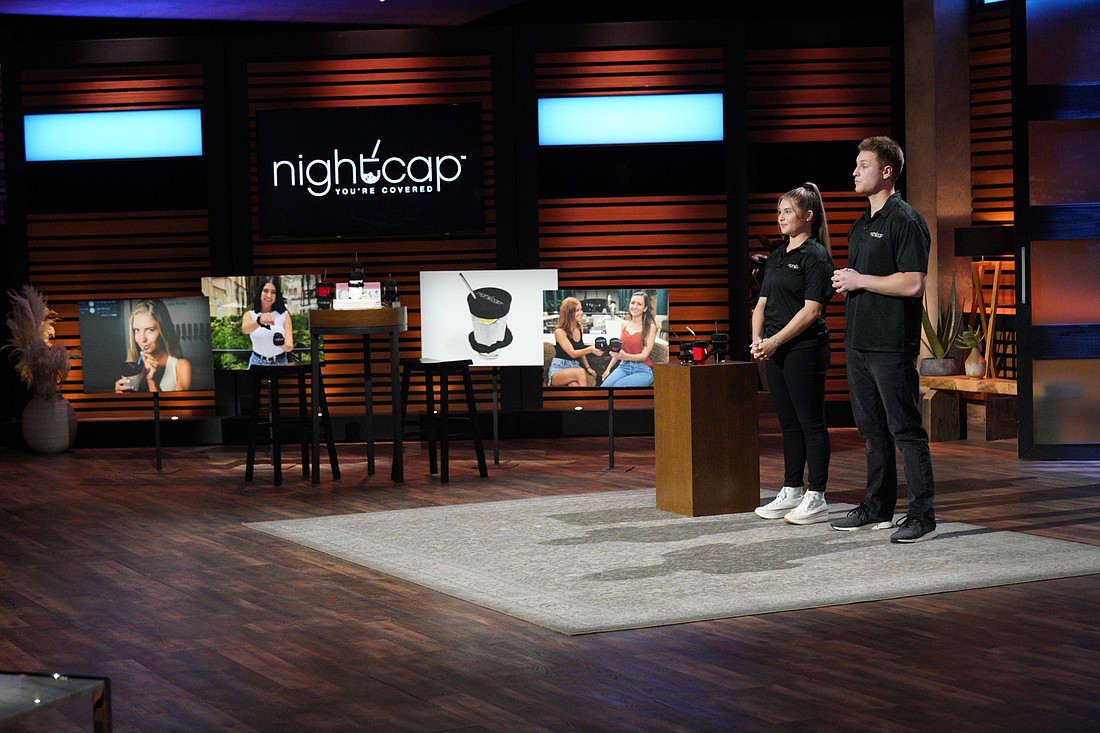- January 14, 2025
-
-
Loading

Loading

The idea first came to Shirah Benarde in a dream. She had heard about drink spiking from friends who were in college, and while dozing one night, she came up with a solution.
The next morning, the then-16-year-old West Palm Beach high schooler grabbed pantyhose from her mom’s closet and a scrunchie. She then created the first prototype for a product to cover a drink to keep it from being spiked with drugs. Knowing she was onto something, she and her dad contacted a local seamstress, who helped create several more prototypes to perfect the product.
'It’s really helpful to surround yourself with people who are trying to also grow their businesses.’ Shirah Benarde, NightCap
Called NightCap, it looks like a scrunchie that can be worn on the wrist. But inside a hidden pocket is a cover that can be placed over a drink, with a hole for popping in a straw.
Now 18 years old and a University of Tampa first-year student, Benarde recently got the chance to pitch her innovative product on ABC TV’s "Shark Tank" in an episode that aired in February. Her brother, Michael, 23, her partner in the venture and an MBA student at Florida State University, joined her on the show.
“It was definitely one of the coolest things that I’ll ever do,” she says. “'Shark Tank' is a show Michael and I used to watch all the time, and I remember always wanting to be on it.”
During the episode, the two quickly scored a deal with Lori Greiner — known as the “Queen of QVC” — who offered an investment of $60,000 for 25% of the company. “We were really lucky,” says Benarde. “It was like, wow, this successful woman liked my idea.”
NightCap has so far sold more than 30,000 units, generating some $350,000 in revenue based on the retail price of $12 each. The product is also building buzz on social media platforms, such as TikTok. The video-sharing app with millions of users has proved a great fit for a product whose biggest client base is currently women aged 18 to 24.
“Before our first TikTok video, we started with $28,000 in sales,” Benarde sats. “When the coronavirus hit, I began posting on TikTok, and it was one of the best decisions.” She says one video she posted helped the company double sales, a factor she thinks contributed to their selection for "Shark Tank."
Prior to making the deal with Greiner, Benarde and her brother had funded the company through an $18,000 investment from their parents, about $12,000 they raised from an Indiegogo crowdfunding campaign and $15,000 in winnings from various college pitch competitions they entered and won while Michael was an undergrad at FSU. Benarde is also part of the Spartan Accelerator at the University of Tampa, a program that pairs entrepreneurial students with business experts to help grow their ventures.
“It’s really helpful to surround yourself with people who are trying to also grow their businesses,” says Benarde, who is, not surprisingly, majoring in entrepreneurship at UT. “You get a lot of access to different kinds of people you can always go to for help. Whenever I need help with something, I can always rely on them.”
NightCap has been getting a lot of attention since the "Shark Tank" episode aired. An Instagram post from Greiner about the product has gotten more than 68,000 views, and a similar one on Facebook garnered more than a thousand likes and almost 200 comments. “Having someone like her behind it really pushed it out there for people to notice it,” Benarde says.
The Benardes have a utility patent for NightCap related to the way the cover is stored in the scrunchie. Competition and copycats will be a factor as the product gets more attention.
“We’re definitely going to try and stay on top of it,” Benarde says. “We’re always thinking of the next best thing to do. The patent protects us from a lot, but we’re already seeing people with products coming out that are pretty similar. It does bother me.”
NightCap is currently sold on the company’s website, NightCapIt.com, where there are discounts for buying in bulk and wholesale options. Backed by her powerhouse partner, Benarde envisions getting it into college bookstores, women’s clothing boutiques, bars and clubs, and a slew of other retail locations. Coming soon, too, are customized versions for branding with specific customers.
“I think that when someone sees the product, they immediately think, ‘Oh, I’ve been in that situation where I’ve been scared of being at the bar,’” she says. “I think everyone has an idea of what that’s like. It’s just a very relatable product. … I think this is just the beginning for the product, and I’m really excited to see where it goes.”